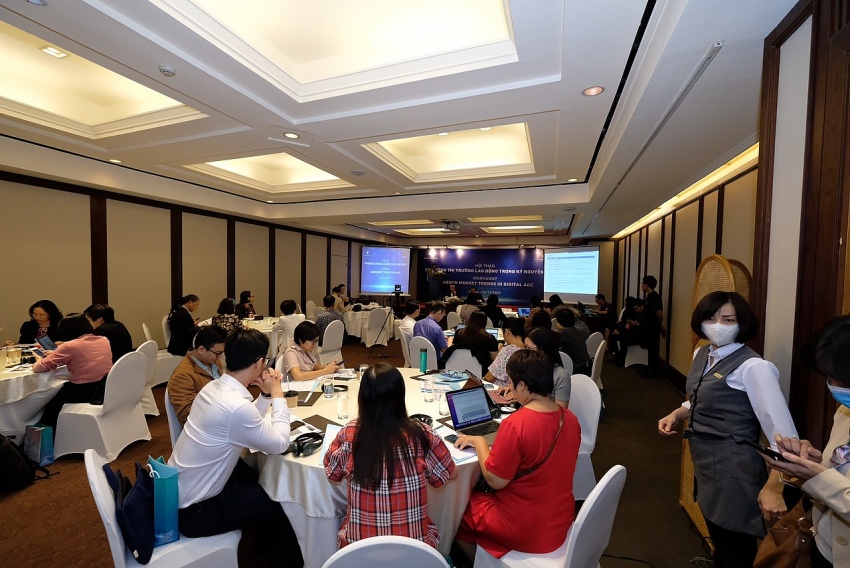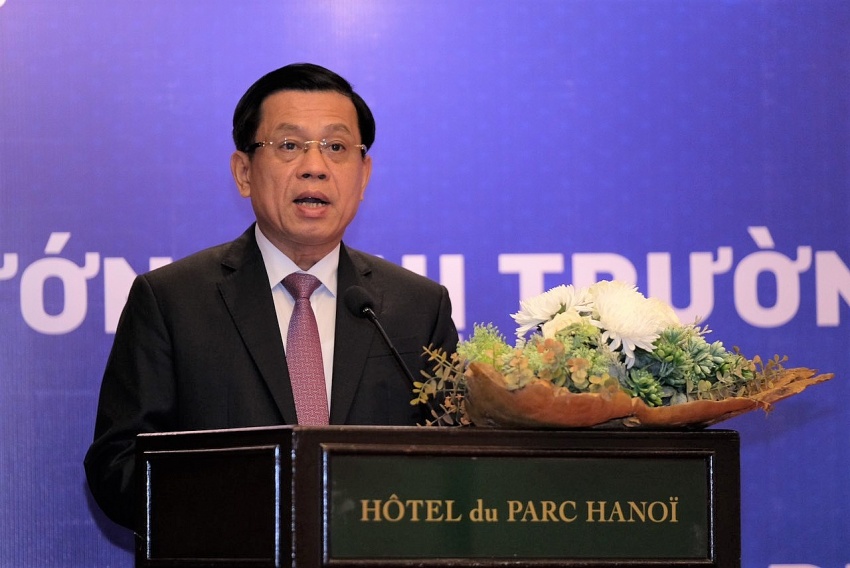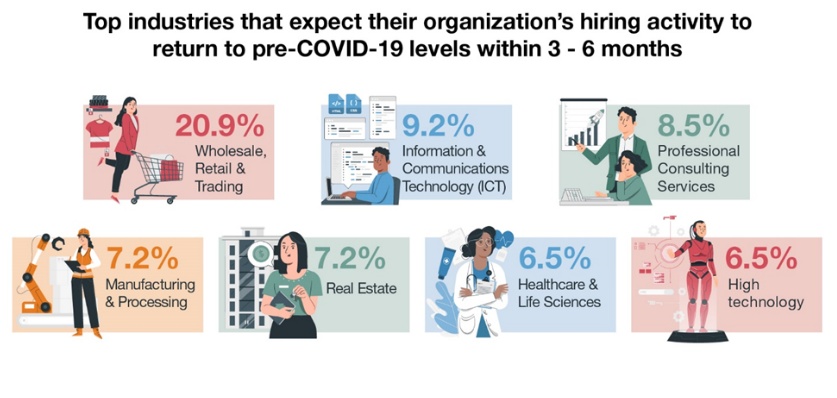Ensuring employment security and skills development in digital age
The hybrid workshop was jointly held by the Ministry of Labour, Invalids and Social Affairs (MoLISA) and ManpowerGroup Vietnam under the theme Labor Market Trends in The Digital Age.
Addressing the event, Nguyen Ba Hoan, Deputy Minister of MoLISA, said that digital transformation, which was accelerated by the global health crisis, is having an impact on national labour and employment.
 |
| Policymakers, businesses, and experts gathered at the workshop on November 8 |
“Amidst the digital transformation, employment security and skills development for workers are among the most important goals for every country. The increasing application of digital technology, smart devices, and robotics in production and business activities poses challenges for Vietnam's low-skilled labour market,” added Hoan.
“An abundant low-cost workforce will no longer be a competitive advantage in attracting foreign investment. Given this context, comprehensive solutions will be required to improve the quality of recruitment and the training of human resources for a future-proof workforce.”
 |
| Nguyen Ba Hoan, Deputy Minister of MoLISA |
Andree Mangels, general manager of ManpowerGroup Vietnam stated, “Technology is constantly evolving and so will the digital skills that workers require. Employers need to adopt an agile approach to employee skilling and create long-term learning strategies that equip their workforce to do the jobs that exist now and those that will be created in the future.”
 |
| Andree Mangels, general manager of ManpowerGroup Vietnam |
At the event, the participants agreed that the local labour market needs comprehensive solutions to improve the quality of recruitment and the training of human resources through skills development and knowledge enhancement to allow workers to adapt to the changing world.
Nguyen Thi Nga, representative of the World Bank on employment added, “According to statistics in Vietnam, 68 per cent of current jobs require digital literacy with basic digital skills, while a fifth of jobs need particularly intensive digital skills. In addition, the use of digital skills at different levels in Vietnam is also different from other countries in the region and around the world.”
Nguyen Xuan Son, country operations manager for staffing and outsourcing services at ManpowerGroup Vietnam said, “Major trends like the growing importance of contingent workers, companies’ efforts to rebuild employee capabilities via skills development programmes, and the rise of the hybrid work model will take place in the new normal.”
 |
| Nguyen Xuan Son, country operations manager for staffing and outsourcing services at ManpowerGroup Vietnam |
Given the acceleration of digital transformation, many jobs will disappear, while new roles will be created. Meanwhile, with only 11.6 per cent being highly-skilled workers, the Vietnamese workforce is considered less competitive than some regional markets like Thailand, the Philippines or Malaysia.
It is estimated by the World Bank that if Vietnam’s pool of skilled workers falls short of what is required by a rapid digital transformation, the economy could lose as many as 2 million jobs by 2045.
Regarding employment issues, Le Thu Huyen from the research team of the Institute of Labour, Science and Social Affairs, under the MoLISA, elaborated that initial regulations exist for those working on technology platforms. For example, Decree No.10/ND-CP on business and conditions for transportation business by car is sufficient as the baseline to establish labour relations between drivers and tech companies.
She, however, admitted that current legal regulations are inadequate to protect gig workers in a comprehensive and transparent manner.
“Vietnam lacks an extensive and straightforward legal mechanism to regulate the relationships between tech companies and workers. A number of legal regulations are disjointedly and dubiously promulgated, thus creating confusion during implementation,” Huyen added.
Sharing her team’s study about jobs that use digital platforms to connect freelancers with customers to provide short-term services like app-based drivers or house helpers, she suggested solutions to effectively manage and ensure social security for gig workers in Vietnam. It’s crucial that the government, employers, and other relevant stakeholders take the necessary action to improve employment security for Vietnamese workers.
Andre Gama, Social Protection Programme manager at the International Labour Organization Vietnam, shared his experience with ensuring social security, as well as some of the challenges and solutions for the digital age.
He said, “The world of work in which the original social security schemes were designed is changing at a very fast pace. Instead of dealing with single, stable, full-time employment relations, and employer and employee being clearly defined, social security systems are increasingly required to deal with non-standard forms of work, such as platform-workers.”
“There are some innovations but most countries are still searching for solutions. Most solutions tried so far internationally deal with specific sectors. Success in finding solutions for these workers is essential to reach universal social security coverage,” he added.
Gama suggested that administrative adaptions include a revision of labour-related legislation (for instance the definition of employment relations), the development of new tools that are more adapted to the characteristics of the workforce, a revision of social security legislation, and exchange of information to better define employment relations and income levels.
Portugal, Spain, and the United Kingdom have classified personal transport e-drivers legally as employees and reversed the burden of proof to companies.
Talking about the country's practice in order to improve the legal system and ensure the social security of employees, including gig workers, Mohammad Kashif, head of Marketing and Client Solutions at ManpowerGroup Malaysia emphasised, “Ensuring adequate social security for workers of all groups is increasingly pursued by the Malaysian government, which is reflected in the amendments of the employment act which are due to be implemented in January.”
 | Employers expect strong hiring outlook for first half of 2022 International and local employers in various sectors are expecting their hiring intentions to rise in the first half of 2022 as the economy is gradually recovering, according to the newly published Vietnam Employment Outlook Survey. |
 | Latest HR trends in logistics revealed Under the impact of the pandemic and digital transformation, the workforce trends witnessed in logistics are not new, but they are recognised as urgent and accelerate daily. VIR’s Bich Thuy had the opportunity for an exclusive interview with Trang Nguyen, country head of Permanent Recruitment and Executive Search at ManpowerGroup Vietnam about the most significant human resources trends in the logistics industry. |
 | Solving talent shortages amid fierce human capital landscape Worker shortages in various fields are creating headaches for both local and foreign-invested businesses (FIE) in Vietnam. Andree Mangels, general manager of ManpowerGroup Vietnam, shares his insights about the current demand for white and blue-collar workers in Vietnam as well as a strategy that employers should apply to attract and retain talent. |
What the stars mean:
★ Poor ★ ★ Promising ★★★ Good ★★★★ Very good ★★★★★ Exceptional
Themes: Digital Transformation
- Dassault Systèmes and Nvidia to build platform powering virtual twins
- Sci-tech sector sees January revenue growth of 23 per cent
- Advanced semiconductor testing and packaging plant to become operational in 2027
- BIM and ISO 19650 seen as key to improving project efficiency
- Viettel starts construction of semiconductor chip production plant
Related Contents
Latest News
More News
- A golden time to shine within ASEAN (February 19, 2026 | 20:22)
- Vietnam’s pivotal year for advancing sustainability (February 19, 2026 | 08:44)
- Strengthening the core role of industry and trade (February 19, 2026 | 08:35)
- Future orientations for healthcare improvements (February 19, 2026 | 08:29)
- Infrastructure orientations suitable for a new chapter (February 19, 2026 | 08:15)
- Innovation breakthroughs that can elevate the nation (February 19, 2026 | 08:08)
- ABB Robotics hosts SOMA Value Provider Conference in Vietnam (February 19, 2026 | 08:00)
- Entire financial sector steps firmly into a new spring (February 17, 2026 | 13:40)
- Digital security fundamental for better and faster decision-making (February 13, 2026 | 10:50)
- Aircraft makers urge out-the-box thinking (February 13, 2026 | 10:39)

 Tag:
Tag:















 Mobile Version
Mobile Version